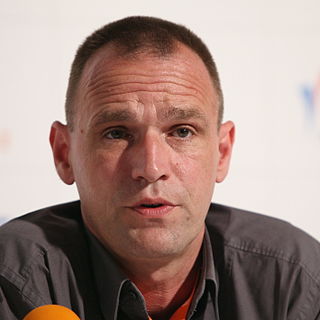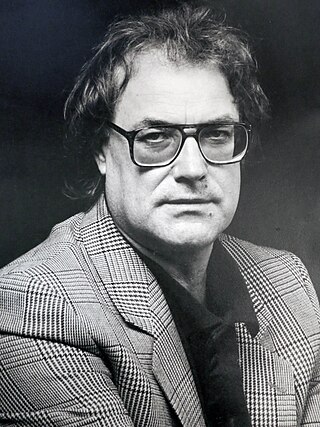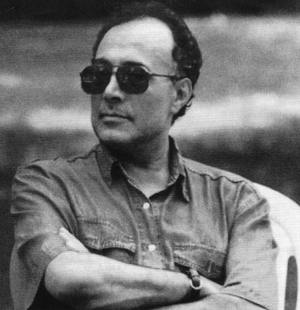Marshal Tito's Spirit (Croatian : Maršal) is a 1999 Croatian film directed by Vinko Brešan. It was Croatia's submission to the 73rd Academy Awards for the Academy Award for Best Foreign Language Film, but was not accepted as a nominee. [1] [2]
The film centers on the Croatian island of Vis in 1998. During the funeral of a local Yugoslav Partisan veteran, his elderly comrades start seeing the ghost of Marshal Josip Broz Tito. After rumours about the apparition spread around, a Split-based policeman who goes by the name Stipan is ordered to investigate the suspicious movements of SUBNOR members in his hometown, a remote Adriatic island whose only connection with the mainland is a ferry that comes around once a week.
Stipan's investigation goes awry, because the leader of former local fighters, Marinko Čičin, considers him a traitor to socialism and a collaborator with the enemy, while locals only speculate of what happened. Stipan learns about the ghost of Comrade Tito from a middle-aged married couple of painters from Zagreb who are looking for inspiration on the island. After a week of investigation, Stipan returns to Split on a ferry together with a large group of locals. The Split mayor Luka, who had previously privatized all state objects in the town, smells a business opportunity and begins organizing communist-era events to attract tourism (May Day parades, Relay of Youth, etc.) and maximise profits. Local Partisan veterans of the 7th Dalmatian Brigade led by Marinko decide to take arms and control the town, turning it into the communist-era shape. The island becomes a pilgrimage destination for retired fighters, who come in droves from the mainland to the island in belief that the time has come for the return of socialism.
The film received 3 nominations and won 9 awards at various international film festivals. [3] Among them, Vinko Brešan won the Best Director Award at the 36th Karlovy Vary International Film Festival. [4]

Vis is a small Croatian island in the Adriatic Sea. It is the farthest inhabited island off the Croatian mainland. Before the end of World War I, the island was held by the Liburnians, the Republic of Venice, the Napoleonic Kingdom of Italy, and the Austrian Empire. During the 19th century, the sea to the north of Vis was the site of two naval battles. In 1920, the island was ceded to the Kingdom of Yugoslavia as part of the Treaty of Rapallo. During World War II, the island was the headquarters of the Yugoslav Partisan movement. After the war, Vis was used as a naval base for the Yugoslav People's Army until 1989. The island's main industries are viticulture, fishing, fish processing, and tourism.

Ivan "Ivo" Brešan was a Croatian and Yugoslav playwright, novelist and screenwriter, known for political satire. His work included screenplays written with his son Vinko.

Vinko Brešan is a Croatian film director best known for directing several notable Croatian black comedies.

The cinema of Croatia has a somewhat shorter tradition than what is common for other Central European countries: the serious beginning of Croatian cinema starts with the rise of the Yugoslavian film industry in the 1940s. Three Croatian feature films were nominated for the Academy Award for Best Foreign Language Film, several of them gained awards at major festivals, and the Croatian contribution in the field of animation is particularly important.

Lordan Zafranović is a Croatian-Czech-Yugoslav film director. He was a major figure of the Prague Wave.

A Wonderful Night in Split is a 2004 Croatian drama film directed by Arsen Anton Ostojić and starring Dino Dvornik, Marija Škaričić, Coolio, and Mladen Vulić.
Život sa stricem is a 1988 Yugoslavian drama film directed by Krsto Papić, starring Davor Janjić, Alma Prica, Miodrag Krivokapić, Branislav Lečić, Anica Dobra and Ivo Gregurević. It is based on Okvir za mržnju, a novel by Ivan Aralica.

The Vela Spila cave is situated above the town of Vela Luka on the island of Korčula, in Croatia on Pinski Rat hill at an elevation of approximately 130 m (430 ft). The cave consists of an elliptically shaped cavern that measures 40 m (130 ft) in length, 17 m (56 ft) in height, and is approximately 40 m (130 ft) wide. There are, similar to the Brillenhöhle in Germany, two openings in the roof of the cave which were caused by collapse at an as yet undetermined time.

Battle of Sutjeska is a 1973 Yugoslav partisan film directed by Stipe Delić. It tells the story of the famous Battle of Sutjeska, the greatest engagement of the Yugoslav Partisan War. The film is one of the most expensive ever made in Yugoslavia. It was selected as the Yugoslav entry for the Best Foreign Language Film at the 46th Academy Awards, but was not accepted as a nominee. It was also entered into the 8th Moscow International Film Festival where it won a Special Prize.

What Is a Man Without a Moustache? is a 2005 Croatian romantic comedy-drama film. Hrvoje Hribar directed the film and wrote the screenplay as an adaptation of Ante Tomić's 2000 novel of the same name.

How the War Started on My Island is a 1996 Croatian black comedy film directed by Vinko Brešan and starring Vlatko Dulić, Ljubomir Kerekeš, Ivan Brkić, Predrag Vušović, Ivica Vidović, Božidar Orešković and Matija Prskalo.
Alma Prica is a Croatian actress. She graduated from the Zagreb Academy of Drama Arts in 1985 and then joined the Croatian National Theatre in Zagreb in 1986. Although primarily a theatre actress, she also appeared in numerous film and television productions.
Kozara is a 1962 Yugoslav film directed by Veljko Bulajić. It is a well known film of the partisan film subgenre popular in Yugoslavia in the 1960s and 1970s and depicts events surrounding the Battle of Kozara.
Leon Lučev is a Croatian actor. He had his feature film debut in Vinko Brešan's 1996 comedy How the War Started on My Island. Since then, he has amassed lead roles in numerous high-profile European films, including Sex, Drink and Bloodshed (2004), What Is a Man Without a Moustache? (2005), Grbavica (2006), The Melon Route (2006), Behind the Glass (2008), On the Path (2010), Silent Sonata (2011), Vegetarian Cannibal (2012), The Miner (2017) and Men Don't Cry (2017).
Živko Zalar is a Croatian cinematographer, son of Croatian cinematographer Slavko Zalar.

Guns of War is a 1974 Yugoslav film directed by Žika Mitrović. It is one of the most notable examples of partisan film, a Yugoslav subgenre of World War II films which was popular between the 1960s and 1980s. The prevailing themes of anti-fascist struggle set in wartime Yugoslavia are also present here, as the film tells the story of the rise and fall of the Republic of Užice, a short-lived territory liberated by Yugoslav partisans which existed for several months in 1941.
Vlatko Dulić was a Croatian theatre, television and film actor and theatre director.
Mate Matišić is a Croatian playwright, screenwriter, composer and musician. His plays have been staged in Croatian theaters as well as internationally, and some of them have been adapted into feature films. As a composer, he is best known for his film and theatrical music. He has won five Golden Arena awards at the Pula Film Festival.
The Priest's Children is a 2013 Croatian comedy film directed by Vinko Brešan.

The 35th Karlovy Vary International Film Festival took place from 5 to 15 July 2000. The Crystal Globe was won by Me You Them, a Brazilian drama film directed by Andrucha Waddington. The second prize, the Special Jury Prize was won ex aequo by The Big Animal, a Polish comedy-drama film directed by Jerzy Stuhr, and by Peppermint Candy, a South Korean drama film directed by Lee Chang-dong. Iranian film director, screenwriter, poet, photographer and film producer Abbas Kiarostami was the president of the jury.